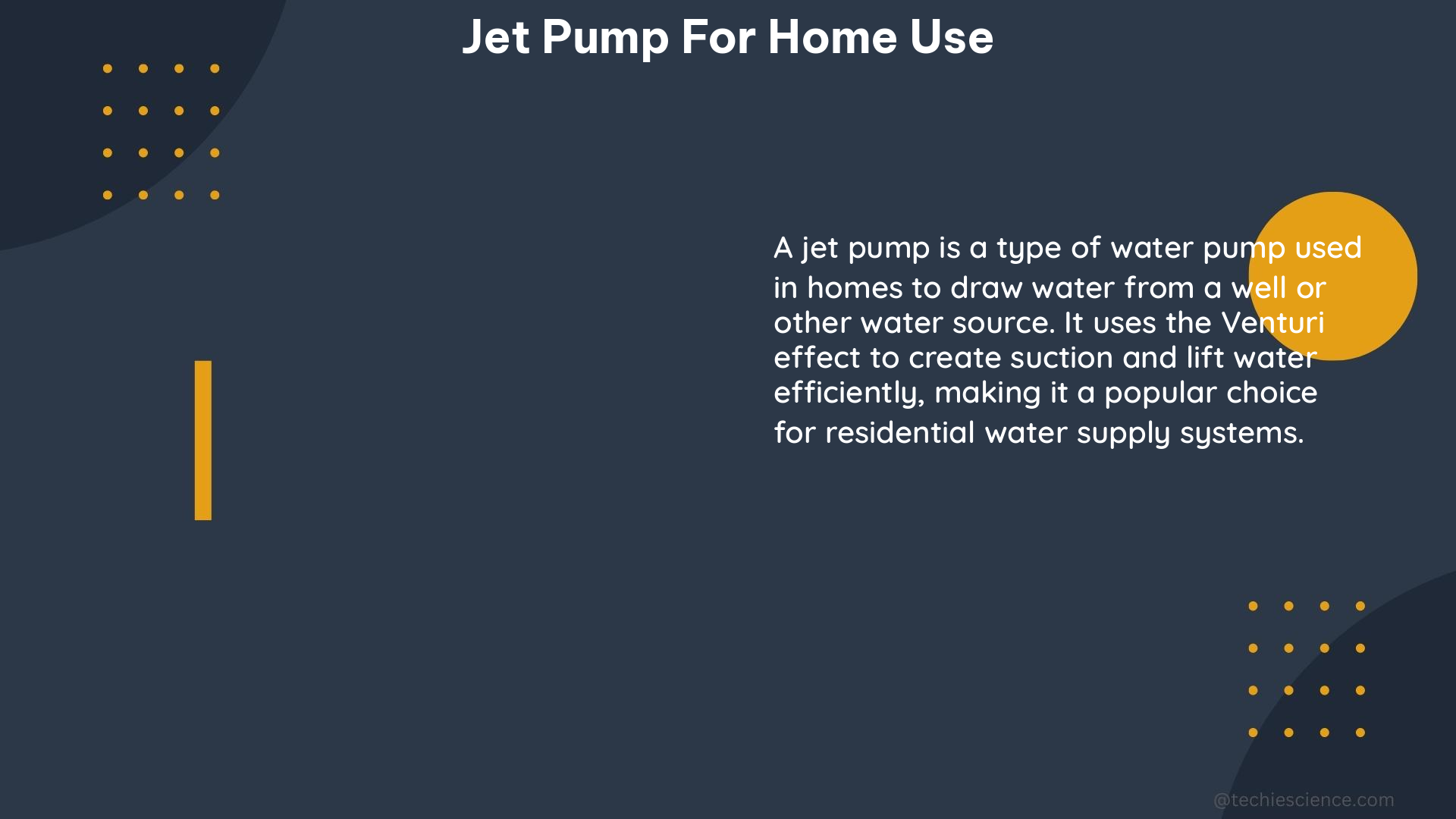Jet pumps are a popular choice for residential water systems, particularly in areas without access to municipal water supplies. These versatile pumps are designed to lift water from wells, cisterns, or other shallow water sources and deliver it to your home’s plumbing system. In this comprehensive guide, we’ll delve into the technical specifications and key considerations for selecting the right jet pump for your home.
Understanding Jet Pump Specifications
Flow Rate
The flow rate of a jet pump is the measure of how much water it can pump per minute, typically expressed in gallons per minute (GPM). This specification is crucial as it determines the pump’s ability to meet your household’s water demand. For a typical home application, a jet pump should have a flow rate of at least 5 GPM, with higher-end models capable of delivering up to 15 GPM.
Total Dynamic Head (TDH)
Total Dynamic Head (TDH) is the total height that a jet pump must lift the water, including the vertical lift, friction losses in the pipes, and pressure losses due to bends and fittings. This measurement, expressed in feet, is an essential factor to consider when selecting a jet pump. For a standard home setup, a jet pump should have a TDH of at least 50 feet, with some models capable of handling up to 100 feet of TDH.
Horsepower (HP)
The horsepower (HP) of a jet pump is a measure of its power output, which directly impacts its ability to lift water and overcome the TDH. The horsepower of a jet pump depends on the size of the pump, the size of the impeller, and the TDH. For a typical home application, a jet pump should have a horsepower of at least 0.5 HP, with higher-powered models ranging from 1 HP to 2 HP.
Voltage and Phase
Jet pumps used in homes are typically single-phase and operate on either 110-120 volts or 220-240 volts. The voltage and phase of the jet pump are crucial specifications to consider, as they determine the type of power supply required for the installation.
Efficiency
The efficiency of a jet pump is a measure of how much of the electrical energy it consumes is converted into useful work. This specification is important as it directly impacts the pump’s energy consumption and operating costs. For a typical home application, a jet pump should have an efficiency of at least 50%, with high-efficiency models reaching up to 70% efficiency.
Selecting the Right Jet Pump for Your Home

When choosing a jet pump for your home, it’s essential to consider the specific requirements of your water system, including the depth of your well, the distance the water needs to be pumped, and the overall water demand of your household. Here are some key factors to consider:
- Well Depth: Determine the depth of your well or water source, as this will directly impact the TDH requirement for your jet pump.
- Water Demand: Assess your household’s water usage patterns to ensure the jet pump’s flow rate can meet your needs, especially during peak usage times.
- Power Supply: Ensure that the jet pump’s voltage and phase requirements match the power supply available in your home.
- Energy Efficiency: Consider the pump’s efficiency rating to minimize energy consumption and operating costs.
- Warranty and Support: Look for a jet pump with a robust warranty and reliable after-sales support from the manufacturer.
Jet Pump Installation and Maintenance
Proper installation and regular maintenance are crucial for the long-term performance and efficiency of your jet pump. It’s recommended to have a licensed plumber or experienced professional handle the installation to ensure the pump is properly integrated into your home’s water system.
Regular maintenance tasks may include:
– Checking and cleaning the pump’s impeller and diffuser
– Inspecting and replacing worn or damaged components
– Monitoring the pump’s performance and energy consumption
– Ensuring the pressure switch is functioning correctly
By following the manufacturer’s recommended maintenance schedule and addressing any issues promptly, you can extend the lifespan of your jet pump and maintain reliable water delivery to your home.
Conclusion
Jet pumps are a versatile and reliable solution for residential water systems, particularly in areas without access to municipal water supplies. By understanding the key technical specifications and selecting the right jet pump for your home’s needs, you can ensure a consistent and efficient water supply for your household. Remember to consider factors like flow rate, TDH, horsepower, voltage, and efficiency when choosing a jet pump, and work with a professional for proper installation and maintenance to get the most out of your investment.
References:
- Community Discussion on Tracking Well Pump On/Off
- Engineering Discussion on Jet Pump Specifications
- DIY Discussion on Water Well Pressure Switch Settings

The lambdageeks.com Core SME Team is a group of experienced subject matter experts from diverse scientific and technical fields including Physics, Chemistry, Technology,Electronics & Electrical Engineering, Automotive, Mechanical Engineering. Our team collaborates to create high-quality, well-researched articles on a wide range of science and technology topics for the lambdageeks.com website.
All Our Senior SME are having more than 7 Years of experience in the respective fields . They are either Working Industry Professionals or assocaited With different Universities. Refer Our Authors Page to get to know About our Core SMEs.